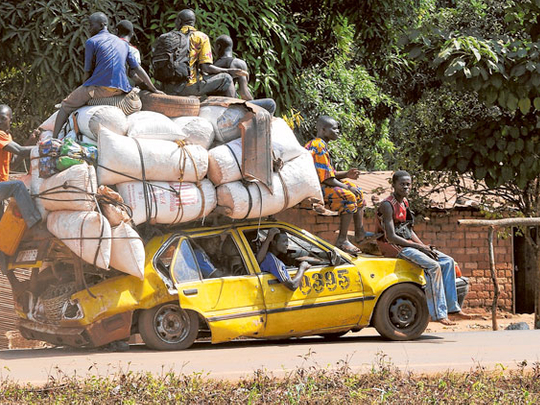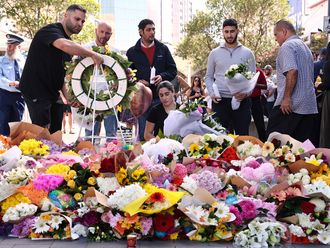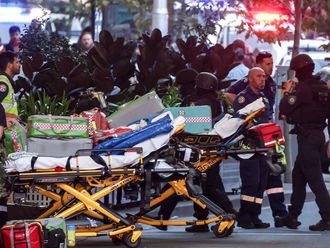
BANGUI: The president of Central African Republic has dismissed his son as acting defence minister along with his army chief of staff as his government attempts to quell a rebellion in the north with the help of soldiers from neighbouring countries.
President Francois Bozize said in a decree read on state radio late Wednesday that he now assumes control of the defence ministry in place of his son, Francis Bozize.
Hundreds of troops from neighbouring countries including Chad, Republic of Congo, Gabon and Cameroon have been arriving in this desperately poor, landlocked country where rebels have seized 10 towns in a month’s time. The rebels have held their position at the key transportation hub of Sibut since December 29 and have made no further advance toward the capital, Bangui.
Government and regional forces are fortifying the town of Damara where truckloads of Chadian troops patrol the streets toting rocket-propelled grenades and other weapons. Damara is about112 kilometres south of Sibut.
Gen. Jean Felix Akaga, who heads the regional force known as FOMAC, says a push on Damara, 75 kilometres north of the capital, would be “a declaration of war” on the 10 Central African states.
“For us, Damara is the red line that the rebels cannot cross,” Akaga said Wednesday. “If they attack Damara, we will attack.”
The United Nations called for talks between the government and rebels and the Security Council scheduled closed consultations on the Central African Republic on Thursday afternoon.
The rebels have indicated they will participate in talks but are also insisting that Bozize go. The president says he will not leave before finishing his term in 2016.
Bozize himself took power in 2003 following a rebellion with the help of Chadian forces. He later went on to win elections in 2005 and 2011, though the opposition and international observers have called the votes deeply flawed.
The rebels behind the latest challenge to Bozize’s rule are made up of four separate groups all known by their French acronyms - UFDR, CPJP, FDPC and CPSK. They are collectively known as Seleka, which means alliance in the local Sango language.
While presenting a unifed front, the alliance is comprised of groups that have previously fought one another. In September 2011, fighting between the CPJP and the UFDR left at least 50 people dead in the town of Bria and more than 700 homes destroyed.
The rebels also include some of Bozize’s former fighters who helped bring him to power but later accused him of failing to properly pay them, among other grievances, Human Rights Watch says.
Earlier, the president already has promised to form a coalition government with rebels and to negotiate without conditions. It’s a sign of how seriously Bozize is threatened by the rebel groups who call themselves Seleka, which means alliance in the Sango language.
Bozize says there’s one point not up for negotiation: he does not intend to leave office before his term ends in 2016.
“We can’t destroy the country. I don’t think that a transition is a good solution for the rebels, for Central African Republic or for the international community,” said Cyriaque Gonda, a spokesman for the political coalition behind Bozize.
But mediators for the government and others note the rebels - an alphabet soup of acronyms in French, UFDR, CPJP, FDPC and CPSK - want Bozize gone. And that’s the only issue the disparate group seems unified on. Seleka is a shaky alliance that lumps together former enemies.
In September 2011, fighting between the CPJP and the UFDR left at least 50 people dead in the town of Bria and more than 700 homes destroyed.
“Even if they show unity in the military action, we know that they are politically very disunited, the only thing that holds them together is the opposition to the current president,” said Roland Marchal, a Paris-based expert on Central African Republic. “If they take control of the capital I think that divisions would appear quickly.”
Gonda, who has negotiated on behalf of the government with the rebels, says some of them couldn’t even accept sitting together as recently as 2008.












